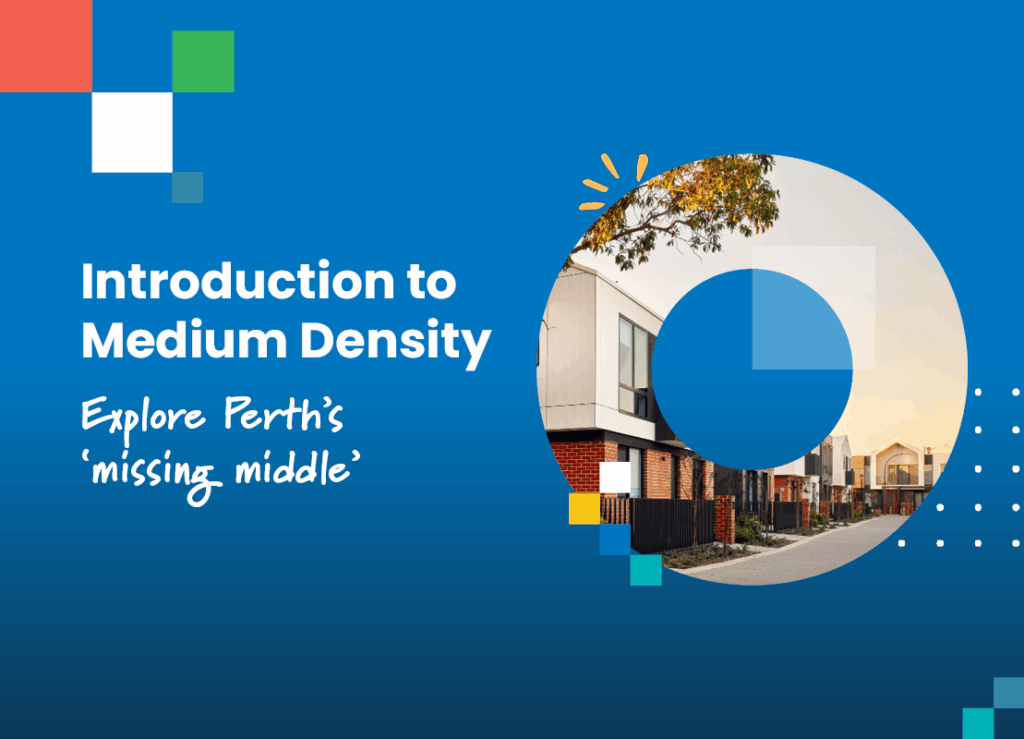Introduction to Medium Density Development
Learning Outcomes
Delivered by industry experts, this course is designed to increase the understanding of:
- The important role of medium density in planning for Perth’s future
- The benefits of delivering medium density offerings(across single houses, grouped dwellings and multiple dwellings), to the market
- The planning framework, including changes to the R Codes, and approvals pathways and processes as they relate to delivering high quality medium density outcomes
- How to plan, design and gain approval for high quality medium density offerings for the target market

Course Summary
A UDIA WA One Day Course focusing on providing a solid introduction to the key considerations and opportunities in planning, designing, and delivering high quality medium density development (across single houses, grouped dwellings and multiple dwellings), in WA.
It’s a great time to explore and promote opportunities in the ‘missing middle’ or ‘gentle density’ – the highly anticipated revised Residential Design Codes Volume 1 (R-Codes) are now in effect as of 10 April 2024 and with increasing cost of living pressures and our housing crisis, demand for more diverse and affordable housing options will only increase.
R-Codes Volume 1 Part C supersedes the 2023 draft Medium Density Code. It’s aimed at encouraging quality, liveable outcomes for single homes R50 and above, grouped dwellings R30 and above, and multiple dwellings R30 to R60. This course will explore the R-Code’s application in a practical sense using case examples.
Course Outline
Planning for a compact and connected city
- WA’s housing crisis and need for housing choice
- The importance of addressing the missing middle and enhancing the quality of medium density product on the market
- Benefits to developers in doing medium density
- Types of medium density product and who they appeal to – demographics, locational factors, and price points
The planning framework
- Overview of the WA planning framework
- Introduction to State Planning Policy 7.3 Residential Design Codes, focusing on the requirements in Vol 1 Part C for single homes R50 and above, grouped dwellings R30 and above and multiple dwellings R30 to R60
- Considerations relating to Local Planning Frameworks/Policies and interrelationship with R Codes
Approval processes and design review in a medium density context
- Subdivision approvals vs development applications
- Approval pathways, processes and key stakeholders
- How the different approval pathways work and choosing which one (Council, DAP provisions and optional call-in, significant development pathway)
- Concept design and design development phases
- Working with Design Review Panels
Community consultation
- Considerations, approaches, tools and techniques in infill and greenfield medium density contexts
- Leveraging local groups such as Town Teams
- Examples of where it has been done well and influenced design outcomes
Medium density done well – single houses and grouped dwellings
- Practical interpretation of the R Code Vol 1 Part C design principles and deemed-to-comply requirements
- Focus on both infill and greenfield contexts
- Examples of what can be achieved for the different housing typologies and street interaction contexts under the new codes (inc. urban design and place creation opportunities)
- Case studies of projects that have been delivered previously and similar outcomes could still be achieved
- Pitfalls and things to be careful of in designing projects
Medium density done well – multiple dwellings
- Practical interpretation of the R Code Vol 1 Part C design principles and deemed-to-comply requirements
- Examples of what can be achieved under the new codes, including for different street interaction contexts (inc. urban design and place creation opportunities)
- Case studies of projects that have been delivered previously and similar outcomes could still be achieved
- Pitfalls and things to be careful of in designing projects
Medium density at precinct view
- Precinct scale planning and design considerations
- Opportunities to push the boundaries
- Examples of innovative housing products / designs / construction approaches in a medium density context
Pricing
Ticket Prices
To obtain member rates please use your company email when registering. All prices are inclusive of GST.
Member: $840 pp
Non-Member: $1,100 pp
CPD Points
Attendance to this course attracts 5.5 REBA CPD Points. To claim these points please send your license type and number to events@udiawa.com.au no later than 2 weeks post course.










